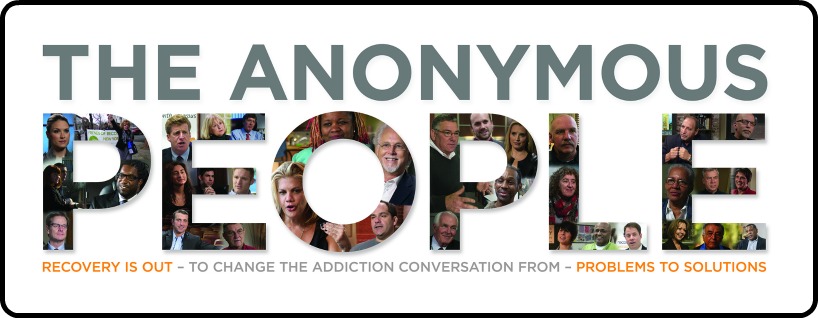Few things have a more negative connotation in the eyes of the public and mainstream media than the idea of addiction. Be it the various tabloid rags foaming at the mouth when a celebrity appears to be on his or her way down into a downward spiral of self destruction or a random Joe Schmo trying to find help dealing with his or her own demons, being described as an addict or saying you have an addiction is not something a person normally feels comfortable in stating to even their closest friends or family.
However, through organizations like Alcoholics Anonymous or the various other groups and fellowships that were spawned by that group’s legendary 12 step program, addicts and those in recovery have been able to find some much needed solace, support and true help. That said, with the world still very much planting a stigma onto the idea of being an addict or having an addiction, most groups survive under the notion of anonymity for each and every member as one of their driving principles. But what happens when the voices of those same junkies, crack heads, burnouts and lushes decide they’ve had enough of the stigmas, enough of the lack of real health care and support and enough of the anonymity that they’ve been told helps make recovery easier but instead just furthers the idea of addiction as something to hide from the world instead of help let the world know people need help.
That’s where a film like The Anonymous People comes in. A feature length documentary looking at the experience of some 23.5 million Americans living in recovery from some form of addiction be it to alcohol or some other drug, this film takes a broad look at the idea of the stigma’s attached to addiction and recovery by painting a handful of very specific portraits of those living that recovery. The film follows a collection of stories ranging from that of former NBA star Chris Herren to beloved character actress Kristen Johnston, all with the hopes of looking at just how deeply worn the threads of judgment are in the eyes of the public when looking at an addict or someone living in recovery.
As the film rightly points out, 2/3 families are somehow affected by addiction, and this is easily one of the most interesting and emotionally resonant looks at that idea and the negative connotations that the world wrongly thrusts upon it. Beautifully crafted by director Greg Williams, the film isn’t much of an aesthetic marvel, especially in the ever experimental world of modern documentary filmmaking, but it more than makes up for it in life, vitality and most importantly its mixture of real and raw emotion opposite insightful and stimulating facts and intellectual discussions.
The interviews with the men and women living in recovery here are absolutely eye opening. Johnston’s interview is particularly entrancing as she is not only a great presence that commands a viewer’s eye, but her story is so raw and engrossing that it really paints a picture of just how strong these men and women truly are. There are a handful of scholarly interviews looking at the history of organized recovery, its relationship to organized faith and the idea of anonymity as one of the great players, both positively and negatively, in the growth of organized recovery, all of which add much needed intellectual depth to an otherwise emotionally driven narrative.
The film is making its New York debut this weekend, and while it may not be a groundbreaking aesthetic work, there are few films you’re likely to find this weekend that will spark a more lively and vital discussion than this emotionally moving piece of nonfiction filmmaking. A truly insightful and unforgettable look at the negative connotations surrounding addiction and recovery, and how we need to break through those barriers or else lives are going to continue to be lost, this picture features a great blend of insightful scholarly interviews as well as true life discussions of just what a great deal of good coming out and letting the world know you need help or how to find it can truly do. This is a real must see documentary.




![Bergman Island (The Criterion Collection) [Blu-ray]](https://criterioncast.com/wp-content/uploads/2022/11/bergman-island-the-criterion-collection-blu-ray-400x496.jpg)
![This Is Not a Burial, It’s a Resurrection (The Criterion Collection) [Blu-ray]](https://criterioncast.com/wp-content/uploads/2022/11/this-is-not-a-burial-its-a-resurrection-the-criterion-collection-blu-ray-400x496.jpg)
![Lars von Trier's Europe Trilogy (The Criterion Collection) [The Element of Crime/Epidemic/Europa] [Blu-ray]](https://criterioncast.com/wp-content/uploads/2022/11/lars-von-triers-europe-trilogy-the-criterion-collection-the-element-of-400x496.jpg)
![Imitation of Life (The Criterion Collection) [Blu-ray]](https://criterioncast.com/wp-content/uploads/2022/11/imitation-of-life-the-criterion-collection-blu-ray-400x496.jpg)
![The Adventures of Baron Munchausen (The Criterion Collection) [4K UHD]](https://criterioncast.com/wp-content/uploads/2022/11/the-adventures-of-baron-munchausen-the-criterion-collection-4k-uhd-400x496.jpg)
![Cooley High [Criterion Collection] [Blu-ray] [1975]](https://criterioncast.com/wp-content/uploads/2022/11/cooley-high-criterion-collection-blu-ray-1975-400x496.jpg)